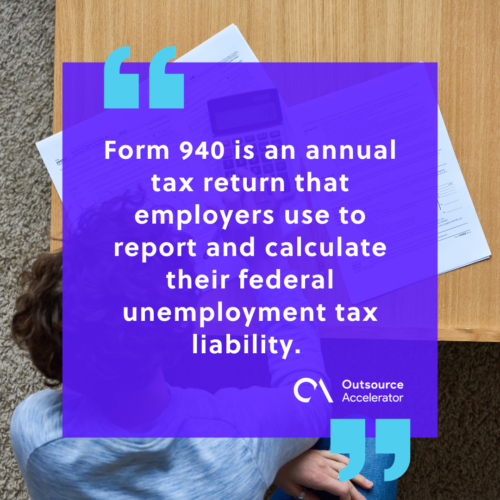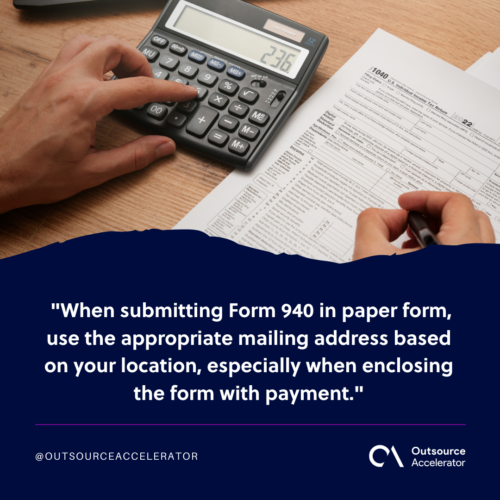Understanding Form 940

In U.S. tax obligations, Form 940 is a critical document that businesses encounter annually.
This form is officially known as the Employer’s Annual Federal Unemployment (FUTA) Tax Return form, which plays a vital role in the relationship between employers and the Internal Revenue Service (IRS).
It is designed to streamline the reporting and calculation of federal unemployment taxes that guide businesses to ensure compliance with regulations that contribute to the national unemployment compensation system.
This article will share knowledge on the purpose of Form 940, the intricacies of the federal unemployment tax (FUTA), and the key considerations that businesses must navigate for a seamless tax-filing experience.
How does Form 940 work for businesses?
Form 940 is an annual tax return that employers use to report and calculate their federal unemployment tax liability. This tax is separate from state unemployment taxes and helps sustain the federal unemployment compensation program.
It is enacted under the Federal Unemployment Tax Act in the United States, which primarily aims to help the state fund workforce agencies through federal employer tax. It comprises unemployment insurance programs relative to job services in every state.

Who needs to file Form 940?
Employers have specific filing requirements for Form 940, which is one of the reasons why many companies have opted to outsource accounting services to monitor submission and avoid penalties properly.
If you meet any of the following criteria, you are exempted or required to file Form 940:
1. Business employers
It refers to one or more employees, full-time or part-time, paying wages of $1,500 or more in any calendar quarter during the current or preceding year.
2. Household employers
These are employers of domestic workers like nannies, caretakers, or housekeepers who pay wages of $1,000 or more in any calendar quarter during the current or preceding year.
3. Agriculture employers
Paid cash wages of $20,000 or more to farmworkers during any calendar quarter or employed ten or more farmworkers for at least some part of a day in each of 20 or more different calendar weeks during the current or preceding year.
4. Indian tribal governments
Services provided by employees of a federally recognized Indian tribal government entity, including subdivisions, subsidiaries, or wholly-owned tribal businesses, are exempt from FUTA tax.
However, the tribe must have fully participated in the state unemployment system during the entire year and adhere to all applicable state unemployment laws.
5. State and local government employers
Services provided by employees of a state, political subdivision, or instrumentality of a state are exempt from FUTA tax.
Where and when to file form 940
The employer will file the accomplished form 940 at the Internal Revenue Service (IRS). There are two options when filing, which employers can choose from.
Email filing
When submitting Form 940 in paper form, use the appropriate mailing address based on your location, especially when enclosing the form with payment. For the most up-to-date mailing addresses, refer to the Form 940 instructions or visit the IRS website.
Electronic filing
The IRS strongly encourages electronic filing for Form 940; businesses with 250 or more employees must file electronically. It helps the IRS to streamline processes through digitalization, considering the challenge of the Covid-19 pandemic.
Electronic filing is facilitated through the IRS e-file system, where instructions are specified at the IRS website or obtained from authorized e-file providers.
The filing of the form can be done in two ways depending on the convenience and preference of the employers or person who will file:
Annual filing deadline
Employers must file form 940 annually, typically every 31st of January of the subsequent year. For example, if you are filing for the 2023 tax year, the deadline would be the 31st of January 2024.
Quarterly deposits
While filing form 940 is done annually, they can make quarterly deposits of their FUTA tax liability annually. These deposits are typically due by the last day of the month following the end of the quarter.
However, if the total FUTA tax for the year is $500 or less, employers can opt to pay the tax annually when filing Form 940.

Key considerations in filing Form 940
There are also key considerations that you must take note of to ensure sound filing of Form 940. Here is the list of things to take for a more seamless and compliant filing experience.
#1 Eligibility
Understanding your eligibility is the first step once you’ve determined that filing form 940 is required.
Whether you’re an individual or representing a company, a proactive approach to understanding and anticipating your tax obligations ensures a smooth filing process with the IRS.
It is beneficial to stay informed about any changes in tax regulations. Consult with a tax professional and gather financial information to accurately address tax responsibilities in submitting Form 940.
#2 Accuracy
Take the time to meticulously review and verify every information entered into the form to ensure absolute accuracy. This level of precision is not just a recommended practice. It’s also a safety measure against potential problems.
Errors in your submission could lead to unnecessary delays, financial penalties, or audit findings. Prioritizing accuracy in your filing will streamline the process and establish a solid foundation for compliance.
The possible risk and inconvenience led many companies to adapt to software application services, providing ease of monitoring deadlines in tax-related form using the work of technology.
#3 Maintaining Detailed Records
Throughout the year, it is recommended to have a comprehensive record of wages paid to employees with all FUTA tax deposits made and shall be available for a minimum of four years.
Careful record-keeping will result in advanced reporting mechanisms and timely compliance. It also provides a comprehensive documentation practice in case of an audit.
Some companies outsource remote workers for records and bookkeeping purposes.
Importance of securing form 940
Businesses have a legal obligation to their employees. Securing the filing of form 940 demonstrates the value of compliance and support of the organization to the aim of its governing policy.
Like any other form, the company should also protect all sensitive information of its employees, including those reflected in Form 940. It conforms with data privacy regulations and helps avoid potential legal liabilities.
Overall, securing Form 940 not only focuses on the part of the company or employer to abide by the regulations.
It also highlights the effort of the government to ensure the attainment of all FUTA-related programs of the state for its people.







 Independent
Independent




